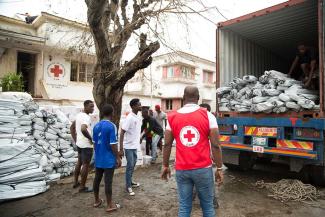Humanitarian action
Tackling climate-related displacement worldwide

One of the worst impacts of the heating climate is that it forces people to leave their home. In a report published in October 2021, the International Federation of Red Cross and Red Crescent Societies (IFRC) addresses this issue. With 192 national branches and around 14 million volunteers, the IFRC claims to be the world’s largest humanitarian network. For at least three reasons, its report “Displacement in a changing climate” is relevant reading:
- It illustrates how climate-related displacement is happening all over the world, both in low- and high-income countries.
- It points out that crises overlap, worsening the suffering humanitarian agencies must deal with.
- It showcases specific measures taken by staff on the ground to tackle climate-related displacement in different contexts and world regions.
At the heart of the report are 11 case studies on work done by National Red Cross and Red Crescent Societies in Australia, Fiji, Germany, Honduras, Iraq, Malawi, Mozambique, Namibia, Samoa, Tuvalu and Yemen. The list shows that climate-related displacement affects low-income countries in Africa, Latin America and Asia as well as high-income countries like Australia and Germany. In Australia for example, from September 2019 to March 2020, bushfires drove tens of thousands of people out of their homes, including indigenous communities. In Germany, torrents caused by heavy rainfall killed at least 184 people and damaged thousands of houses in 2021.
Scientists agree that the climate crisis is increasing both the frequency and intensity of extreme weather events. Such events are actually causing more displacement than violent strife. According to the Internal Displacement Monitoring Centre (IDMC), 30 million people were forced from their homes by disasters like storms, droughts, flooding or wildfires in 2020. By comparison, 9.8 million fled from violence.
Mutually reinforcing crises
Climate-related displacement is a global challenge, but things are particularly bad in low- and middle-income countries where, as the report points out, people are especially vulnerable. Moreover, many people face multiple crises, with natural disasters, diseases and violent conflict becoming mutually reinforcing.
Yemen, for example, has been devastated by an armed conflict for years (see Tamuna Sabadze on www.dandc.eu). Covid-19 put the country’s health system under further pressure. In both 2020 and 2021, extreme flooding further compounded the humanitarian crisis. It affected hundreds of thousands, many of whom were internally displaced persons (IDP) and were forced to flee once more. Thousands of houses were destroyed. Among other things, according to the report, volunteers from the Yemen Red Crescent Society had to:
- provide first aid,
- distribute food and hygiene items,
- assist evacuation operations and
- lend psycho-social support.
Both IDPs and host communities need support, as the report emphasises. The humanitarian intervention is therefore expected to continue for several months in Yemen.
More generally, the report states: “Community engagement has been fundamental to managing tensions in circumstances where both host and migrant populations are in situations of acute humanitarian need.” For example, drought caused hundreds of Angolan citizens to cross the border to Namibia in March 2021. They fled to areas familiar with food insecurity themselves. The case study sees a potential for conflict, especially as it is uncertain how long the Angolans will stay. To reduce tensions, the Namibia Red Cross Society has cooperated closely with the government. While the former supported the Angolan migrants, the latter provided food items and seed to the host community. Moreover, the Red Cross has been engaged in awareness raising among local people.
Preventive action
The report emphasises that preventive action is important. The point is not simply to prepare to help displaced people, but to keep the numbers of displaced people as small as possible. The small island state of Tuvalu, for example, is prone to drinking water shortages. Droughts are likely to make things worse. To facilitate timely action, the Red Cross is monitoring meteorological forecasts in order to predict the extent of water scarcity on seven islands. The goal is to understand current and likely impacts on health and livelihoods, the IFRC reports.
Disaster management is complex and usually involves many parties, including different government authorities and civil-society organisations. If they are to respond well, the law must empower them to do so. The implication is that prudent legislation is essential for effective and efficient action. The responsibilities of different parties must be defined well. Moreover, laws and regulations can provide a basis for covering the needs of everyone, including host communities, refugees and IDPs. Case studies on Malawi and Fiji show how Red Cross National Societies and IFRC´s disaster law unit advised countries on how to update their disaster laws.
A core recommendation of the report is to deal with climate-related displacement in national legislation, policies and strategies. Moreover, governments should scale up action to avert climate-related displacement.
The report also recommends what donors should do. The list includes:
- providing climate-related funding in flexible and accessible ways,
- linking climate finance to humanitarian aid, development spending and disaster-risk reduction and
- supporting local communities and local organisations.
The IFRC report provides a testimony of the devastating impacts the climate crisis has on people´s livelihoods, but it also inspires hope. The case studies illustrate that, by enforcing coordinated and well-prepared action at the grassroots level, governments and civil-society organisations are capable of mitigating the impacts of climate-related disasters. As global temperatures are rising, their work has only just begun.
Link
IFRC, 2021: Displacement in a changing climate.
https://www.ifrc.org/sites/default/files/2021-10/IFRC-Displacement-Climate-Report-2021_1.pdf
Jörg Döbereiner is a member of the editorial team of D+C Development and Cooperation / E+Z Entwicklung und Zusammenarbeit.
euz.editor@dandc.eu







